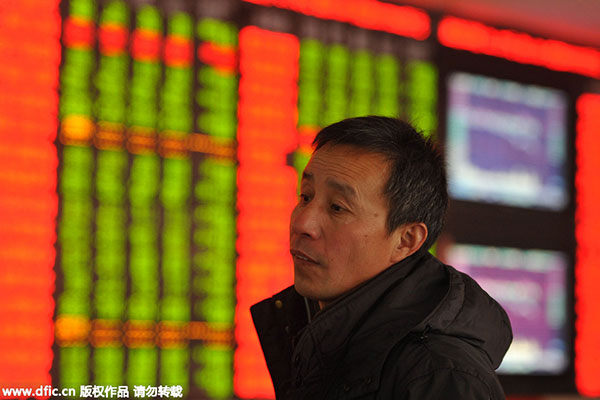 |
|
An investor walks past an electronic trading screen at a brokerage in Fuyang, Anhui province, Nov 27, 2015. [Photo/IC] |
That is music to the ears of foreign brokers and wealth managers and to local entrepreneurs who can make a profit on their coat tails, for the sums involved could be vast.
Investment bank China International Capital Corp Ltd said China's high-net-worth individuals control $4.4 trillion in assets, but allocate only 5 percent of their wealth overseas, compared with a global average of 24 percent, and ordinary middle-class savers hold further trillions on deposit in Chinese banks.
If both groups reallocate their assets in line with global norms, some fund managers said as much as $6 trillion of Chinese money could find its way into overseas stock and bonds.
Money is already leaving China, especially after a summer stock market crash and August's devaluation of the yuan. In November, China's foreign exchange reserves drained by their third-sharpest rate ever to their lowest level since early 2013.
Official figures do not distinguish between retail and institutional investment, but Chinese purchases of offshore debt and equities rose a hefty 11 percent in the second quarter. And they do not capture reallocations from existing offshore portfolios, including real estate, home to many billions of dollars of Chinese money.
Domestic fund managers said growing interest in a program that lets local mutual funds invest in offshore assets is revealing.
The Qualified Domestic Institutional Investor?program had failed for years to attract much interest from Chinese until this year, when institutions started bidding up the price of the program's investment quotas traded between them.
"QDII quota suddenly became very expensive this year," said Shen Weizheng, fund manager at Shanghai-based Ivy Capital, who plans to launch a Hong Kong bond fund to meet rising demand for overseas assets from mainland clients.
"Domestic capital is rushing out as the yuan is no longer firm," he said.
Brian Qian, a 33-year-old risk controller at a Chinese bank, fits the profile of this new breed of investors.
He said he had invested several million yuan, half his investable wealth, into overseas stocks and bonds in 2015.
"Investment returns in China are much lower than previously," he said, and he no longer trusted the local stock markets after the summer crash, nor China's risky high-yield wealth management products.
This growing distaste for local assets is balanced by steadier returns from overseas markets.
Chinese businesses are gearing up to help those looking to make the switch, with Dacheng Fund Management Co building a dedicated investment team to help Chinese invest overseas.
The problem for many such investors is not working out what to invest in but how.
Officially, there is a $50,000 annual limit on individuals moving money out of China, though many have found ways round that to invest in overseas property.
Wary of the economic impact of outflows when growth is slowing, Beijing has been making it harder to get money out, freezing further QDII quota approvals since March and suspending applications for a yuan-denominated version of the program as recently as Wednesday.
